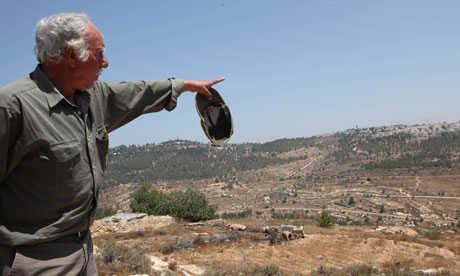 Sixty-three-year-old Ahmed Bargouth sits in the shade of a walnut tree and contemplates the view before him.
Sixty-three-year-old Ahmed Bargouth sits in the shade of a walnut tree and contemplates the view before him.
Behind Bargouth is the Jewish settlement of Har Gilo, built – illegally under international law – on occupied Palestinian territory and fast encroaching on what remains of the diminished village.
And in front of Bargouth's garden, planted with figs, plums, grapes and pomegranates, is an ugly scar of raw flattened earth where Israel is erecting a section of its separation barrier that will encircle the village and cut off farmers from fields, students from places of learning and patients from hospitals.
The original route of the barrier – which Israel says is necessary for security reasons – would have cut Al Walaja in two. The community launched a legal petition to keep the village intact, which was granted – with the catch that the revised route, announced in April 2006, would completely encage the village. Al Walaja would become a tiny Palestinian enclave connected to the nearest West Bank town by one road or tunnel controlled by a checkpoint.
This spring the bulldozers arrived. To Bargouth's dismay and anger, the barrier – which he expects to be a concrete base topped by a fence – will run through his land a few metres from his house. To create the required 100 metre-wide strip of restricted ground for the barrier's route, the Israeli military uprooted 88 of Bargouth's olive trees.





 Why are the monks walking?The monks embarked on the journey to remind Americans that peace is...
Why are the monks walking?The monks embarked on the journey to remind Americans that peace is... Alberto Castañeda Mondragón says his memory was so jumbled after a beating by immigration officers that...
Alberto Castañeda Mondragón says his memory was so jumbled after a beating by immigration officers that...






























